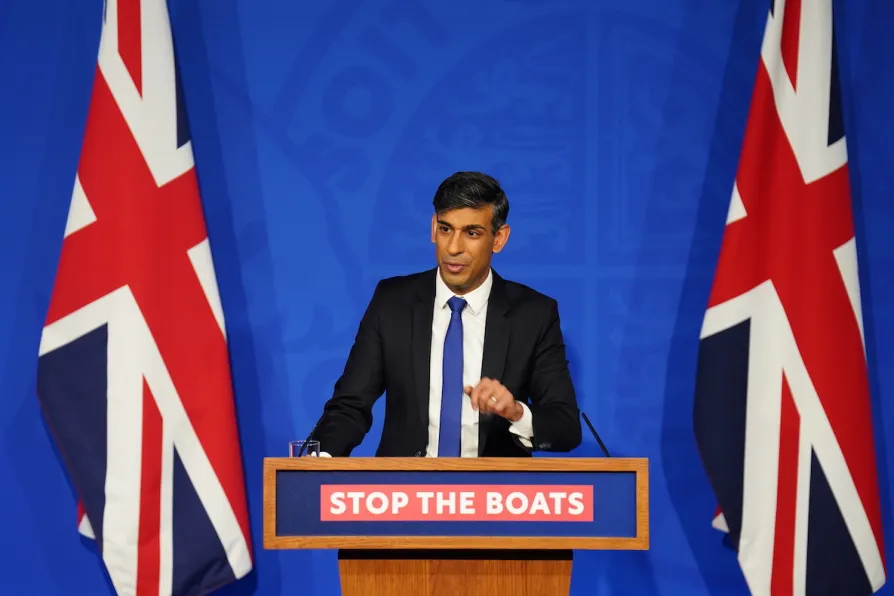
 Prime Minister Rishi Sunak during a press conference in the Downing Street Briefing Room, London, where he insisted his new Rwanda legislation "blocks every single reason that has ever been used to prevent flights" and claimed going any further would mean "the entire scheme will collapse". Picture date: Thursday December 7, 2023.
Prime Minister Rishi Sunak during a press conference in the Downing Street Briefing Room, London, where he insisted his new Rwanda legislation "blocks every single reason that has ever been used to prevent flights" and claimed going any further would mean "the entire scheme will collapse". Picture date: Thursday December 7, 2023.
RISHI SUNAK is floundering. At his emergency press conference today, called in the aftermath of his immigration minister’s resignation and a fresh broadside from ex-home secretary Suella Braverman, he cut a sorry figure.
Repeated demands that journalists asking awkward questions direct their scrutiny to the Labour opposition rather than the government itself would sound pathetic from any PM. Here they reveal Sunak’s real fragility: despite an 80-seat majority, he fears a Tory revolt so sizeable that without the Labour support he kept demanding he could see his legislation defeated.
So it should be. The Tories baying for Sunak’s blood are coming from his right, of course. Jenrick and Braverman want even more drastic attacks on refugees’ human rights than the PM.
Nor has the Labour Party taken anything resembling a principled defence of refugee rights, attacking the Rwanda scheme on grounds of cost and inefficiency rather than its inherent inhumanity. But Sunak’s new Bill is pernicious and should not reach the statute books.
It disapplies whole sections of the Human Rights Act from people who arrive here by irregular routes. It cancels their right to a hearing on almost any grounds: “Our domestic courts will no longer be able to use any domestic or international law, including the Human Rights Act, to stop us removing illegal migrants.”
Sunak’s response to Supreme Court judges’ ruling that Rwanda may not qualify as a safe country to deport people to? To define it as safe by statute, so judges don’t have the power in future to determine otherwise, whatever is happening in Rwanda.
This is an extreme attack on refugee rights. It is all very well for Tory MP Chris Heaton-Harris to say that if mainstream parties don’t take action on these issues “the debate gets represented by more extreme elements that no one would like to see in charge of our country.”
He points to the success of such far-right parties in Europe (something he knows about, since in 2019 when as Brexit minister he was accused of breaching the ministerial code through an unofficial meeting with Spain’s Vox party).
It is true that the far right are on the march across Europe, which gives the lie to liberal notions that Britain’s toxic anti-immigrant politics are a Brexit-generated anomaly.
But little is gained if to block fascist parties we simply adopt their policies: indeed, in France government xenophobia has served to legitimise the politics of Marine Le Pen’s National Rally. Nor will Sunak’s supposed compromise end there. The Tory outriders demanding a complete breach with the Refugee Convention and the European Convention on Human Rights will see their project advanced if this law passes, even if for tactical reasons they decide to vote against it to hurt Sunak.
We urgently need to build mass community-level opposition to the government’s demonisation of refugees.
Boat arrivals have risen in recent years because we have cut off safer routes. The refugee crisis internationally is the product of wars, many of which Britain has been involved in either directly or fuels through arms supplies or other logistical support, and of global warming, which developed countries like Britain are disproportionately responsible for too.
And the wholesale removal of refugee rights is linked to the government’s policies on legal migration, where cruel bans on workers bringing in family members aim at creating a two-tier workforce and new pay thresholds effectively confine the right to marry a foreigner to those earning well above the average wage.
This is racist legislation designed to divide and disempower. The government resorts to it because it refuses to solve people’s actual problems by investing in public services and raising pay, or confront people’s real enemies in the boardrooms and the banks.
We have to change the whole conversation. A revived grassroots anti-racist movement has to start pushing politics in the other direction.

From Gaza protest bans to proscribing Palestine Action, political elites are showing a crisis of confidence as they abandon Roy Jenkins’s apologetic approach for Suella Braverman’s aggressive ‘hate march’ rhetoric, writes PAUL DONOVAN

The left must avoid shouting ‘racist’ and explain that the socialist alternative would benefit all












